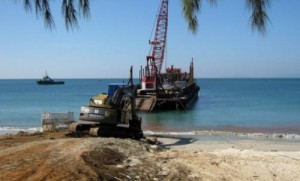Japan’s Opportunity to Prove Itself a Responsible Investor in Burma
By Burma Partnership • December 16, 2013 As Japan deepens its economic ties with Burma at the Japan-ASEAN summit in Tokyo, civil society from Tavoy, Tenasserim Region, express concerns over investing in a huge special economic zone that has already caused widespread human rights violations.
As Japan deepens its economic ties with Burma at the Japan-ASEAN summit in Tokyo, civil society from Tavoy, Tenasserim Region, express concerns over investing in a huge special economic zone that has already caused widespread human rights violations.
Adding to the US$867 million in loans pledged in May, Japanese Prime Minister Shinzo Abe promised a further US$578 million in loans for infrastructure development for the Thilawa Special Economic Zone (SEZ), as well as upgrading Burma’s railway network. Another agreement was made in which greater protections for Japanese businesses investing in Burma are established, thus creating a safer environment to explore business opportunities.
Japan is already heavily invested in the Thilawa SEZ, with a consortium agreed upon by the governments of Japan and Burma in October 2013 in which major Japanese companies, including Mitsubishi, Marubeni and Sumitomo, will partner with domestic companies to develop the zone. While the development of Thilawa SEZ is making progress, human rights concerns, particularly over forced eviction of farmers to make way for infrastructure development continue to cloud this project. Leading up to the Japan-ASEAN summit, Human Rights Watch issued a letter to Prime Minister Abe highlighting, among other human rights abuses to be denounced in the ASEAN bloc, the problems of Japanese investment in Thilawa SEZ and urged Japan to “view the Thilawa project as a cautionary case study setting out Japan’s obligation to help ensure that the rights of local communities are supported against capricious, abusive and illegal displacement.”
This cautionary case study also applies to another SEZ, Tavoy SEZ, in Tenasserim Region. Tavoy SEZ is a highly ambitious project, four times bigger than Thilawa SEZ, which plans to be a regional transport hub, linking Europe and the Middle East with ASEAN and the South China Sea. Planned components include a deep sea port, transport links to Thailand, industrial estates and power plants. Primarily a joint Burma-Thailand venture, it has struggled to attract the same investment as Thilawa SEZ. Initial construction has started, including a small port and road links, but the main company involved, Italian-Thai Development Plc (ITD) lost its concession as it could not find sufficient investment. Now, Tavoy SEZ is being managed by a Special Purpose Vehicle (SPV) that has divided the project into seven components that are open to bids. Both the Thailand and Burma governments are keen to attract Japanese investment in Tavoy SEZ although the official position of Japan remains unclear.
Initial work on Tavoy SEZ has already created problems. The environmental affects of heavy industry on this pristine coastline will permanently damage water supplies, create stifling pollution and destroy local ecosystems. Furthermore, a lack of consultation or fair compensation has left local villagers disenfranchised as they are losing their land with inadequate compensation and little opportunity to pursue future livelihoods. In a statement, Dawei Development Association (DDA), a network of activists, monks, civil society organizations who represent the affected people of this project, urged the Japanese government to follow international best practices and refrain from investing in dirty industries in this project. In the statement, after highlighting the problems of lack of consultation and forced displacement, Thant Zin, Coordinator of DDA states, “Japan has clear guidelines to protect against negative social and environmental impacts of development projects on local communities. With such serious concerns about the project so far, the Japanese government and investors must be sure to follow these guidelines before investing in the [Tavoy] SEZ.”
The Tavoy SEZ, although in its early stages, has been plagued by a lack of transparency, minimal consultation with affected communities, forced eviction and the lack of implementation of social and environmental safeguards. If Japan is to invest in this mega project, as it has in Thilawa SEZ, it must ensure that international best practices are adhered to and affected people are adequately compensated for any negative consequences suffered. If Tavoy SEZ is to be the showpiece project that both the Thai and Burmese governments envision, it must set the standard for any future investment in Burma by complying with international standards and best practices.
Tags: Burma Partnership, Tavoy Deep Sea PortThis post is in: Blog
Related PostsBurma Partnership Celebrates Continuing Regional Solidarity for Burma and Embraces the Work Ahead for Progressive Voice
Burma Army Displays Blatant Disregard for 21st Century Panglong Peace Process
Ann Din Coal Power Plant: Local Movement and Action to Preserve and Protect Natural Resources and Land: Mon IDP Report Case Study #4
Latest Human Rights Abuse Case Demonstrates Urgent Need to Reform the Myanmar National Human Rights Commission
Human Rights Far From Guaranteed as US Sanctions on Burma Are Removed









 All posts
All posts